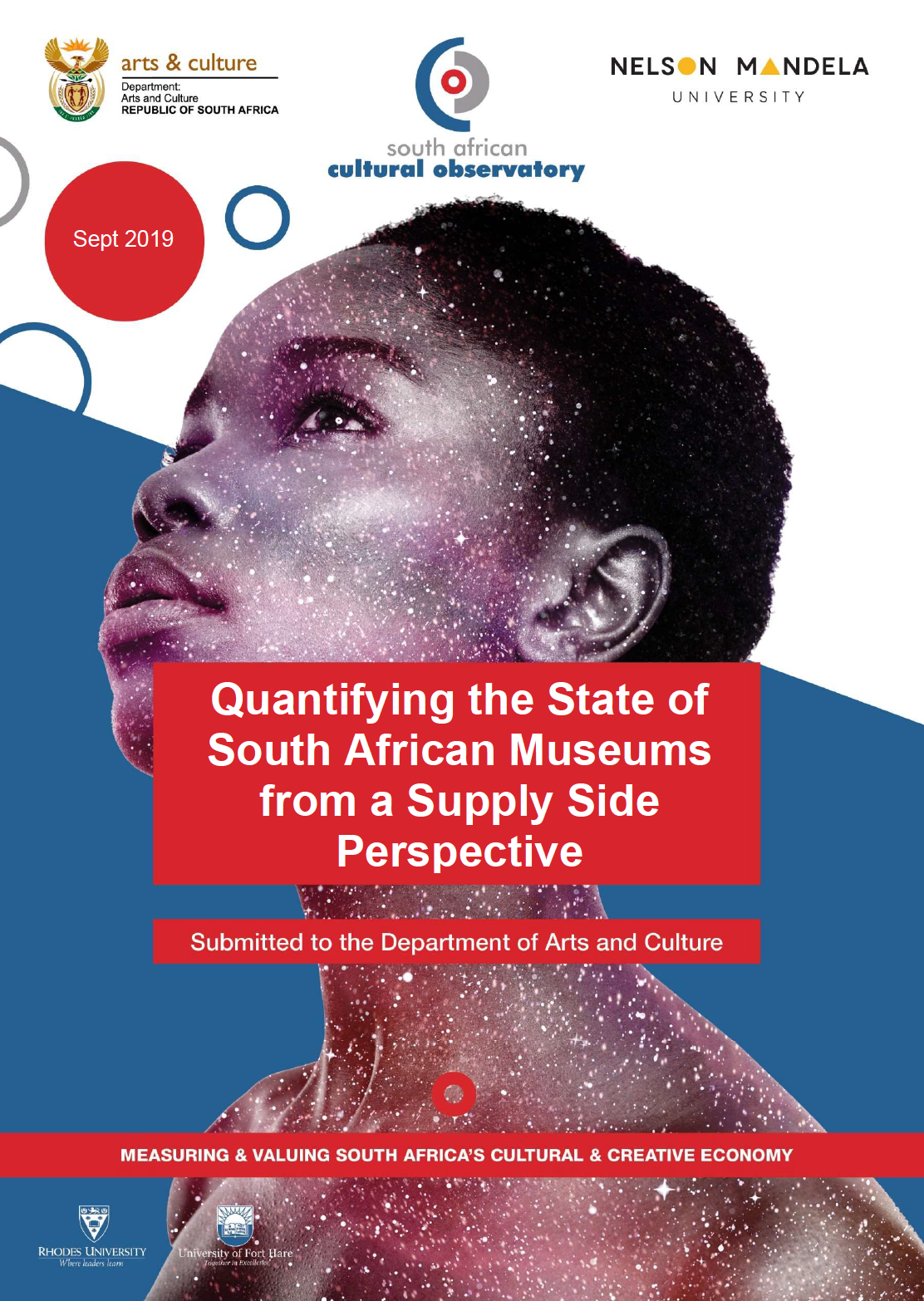
Submitted in September 2020 by the South African Cultural Observatory to the Government of South Africa.
Read the full report here.

Submitted in September 2020 by the South African Cultural Observatory to the Government of South Africa.
Read the full report here.
The 11th Symposium of Chinese Science Museums “Science & Technology Collections – Collection, Research, and Communication” is hosted by China Association for Science and Technology – Research Center of Science Communication and Popularization (CAST-RCSCP) of Tsinghua University, China Science and Technology Museum (CSTM), and Journal of Natural Science Museum Research, and supported by Chinese Museums Association (CMA), Chinese Association of Natural Science Museums (CANSM), Scientific Instrument Commission (SIC).
A wide range of topics will be covered, but not limited to, the following areas:
What is the role of collections in science museums in the digital/new media/Internet age? Science museums usually held collections, while science centers did not accumulate or study collections. We will invite experts to share their studies on current situation, problems and reasons referring to collections in Chinese science museums.
For collecting contemporary science and technology, which is different from the much older science and technology, the questions range from how to identify what to collect, how to collect the objects and documents, how to preserve what is being collected to what to do with what is being collected.
How to transform collections into exhibits/digital/ cultural and creative products? How to explore the relationship between collections and science education?
Each topic will have a 120-minute time slot for 3-5 speakers. A 30-minute panel discussion will be featured at the end of each topic. We look forward to discussing these timely topics with professionals from science museums, universities, research institutions, as well as the industry of science popularization. The symposium will be in Chinese, and simultaneous interpretation is only provided while international speakers make their presentations.
The day commences at 8:30 am, finishing by 6:00 pm. Registration will be required. There will be no registration fees charged. Furthermore, lunch during the symposium will be arranged by the secretariat of the symposium.
The seminar will focus on the topic “Collecting Contemporary Science and Technology”. Today, in science museums, universities and national research institutions around the world, collecting contemporary science and technology is a much discussed topic. The questions range from how to identify what to collect, how to collect the objects and documents, how to preserve what is being collected to what to do with what is being collected. It is recognized by all that collecting contemporary (defined here as post 1960) science and technology requires an approach different from that of collecting much older science and technology.
Confirmed Speakers:
Dr. Richard Kremer, President of the Scientific Instrument Commission.
Mr. Gabriel Bevilacqua, Vice-Chair of ICOM CIDOC.
Mr. Claude Faubert, Coordinator of the ICOM-ITC.
Please feel free to contact Ms. Bai Ting from the secretariat of CSTM for more detailed information about the symposium.
Announcement in Chinese
The South African Museums Association Bulletin (SAMAB) provides a forum for the publication of peer reviewed articles that promote the discussion, debate and the dissemination and exchange of information on aspects of museology, with particular but not exclusive reference to South Africa. SAMAB also enables the communication of current issues, practices and policies regarding collections management, curatorial discourse, museum administration, research, exhibitions, visitor studies, community engagement, education, conservation and other topics relevant to the museum and wider heritage sector.
The theme for SAMAB 2019 is (Re)define our museums. This is to invite South African museums and their professionals to reflect on what it means to redefine the South African museum and its sector. In an era of post democracy, museums claim to have transformed, adjusted and re-invented, however principles, practices and policies need to address the dire crisis museums are in, when by definition we no longer seem to reflect the challenges, manifold visions, and responsibilities we face. This theme is an active response to the International Council of Museums (ICOM) call to revise the conversation about the existence of museums and redefining museums.
ICOM is calling upon museum professionals worldwide to take part in creating a new museum definition and an open call for proposal has been made. The definition has only seen minor adjustments over recent decades, but does not reflect and express adequately the complexities of the 21st century and the current responsibilities and commitment of museums nor their challenges.
South African Museums have the ability to influence society and foster change, they are instruments of identity and some would argue that museums are rapidly losing their power and place in society. The fourth draft of the revised edition of the White paper of Arts and Culture (2017) expressed that the role of museums within South Africa have the potential to radically shift from an institutional landscape of current lack and isolation to a landscape of creative and cultural relevance and social change. The fragmented dispensation of museums, poor policy and the lack of an integrated national museum commission and what constitutes and defines a museum in a highly charged, political and corrupt landscape is one of the many challenges. This re-definition comes at a crucial stage in South Africa’s economic, political and social climate entering a new era.
We welcome submissions, papers and academically sound opinion pieces about the topic of re-defining South African museums and can include but are not limited to address some crucial questions:
This issue will be published in December 2019
Submission Deadline: 1 June 2019
For more info, please contact Sian Tiley <sian.tiley@up.ac.za>
Call for nominations for the SAMAB Editorial Board.
During the International Symposium ‘Activities of University Museums and their Significance’, organised by the University Museum Association of Kyoto, at the end of last month, Kyoto University Museum and National Cheng Kung University Museum (NCKU), Taiwan, signed their second MoU to extend cooperation for another five years.
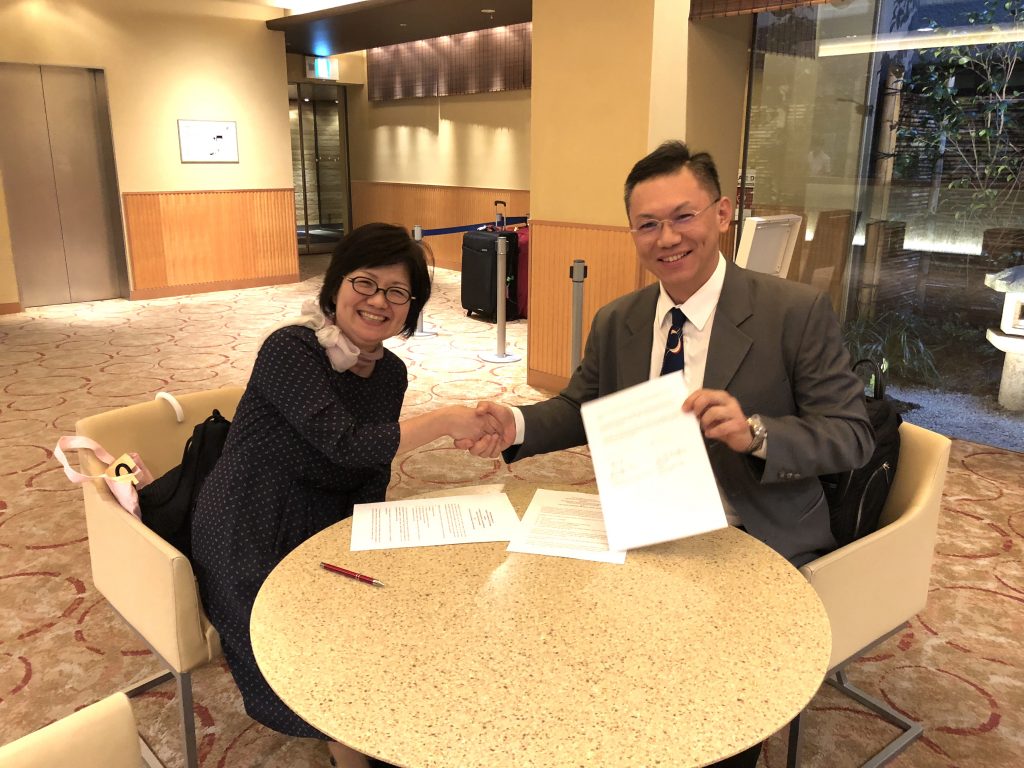
NCKU Museum visited Kyoto University Museum unofficially in 2008 for the first time after its own establishment in 2007 in order to learn from the experience of Kyoto. The first MoU between Kyoto University Museum and NCKU Museum was signed in 2013. Since then, they have been cooperating in collection research, academic symposiums, and management experience exchange. A recent cooperation is a collection research by a curator from NCKU Museum to study the collection of Taiwan’s aboriginals at Kyoto University, which will be exhibited in Taipei with a special traveling exhibition of the 14 members of University Museum Association of Kyoto in December 2019.
With this renewed MoU, NCKU Museum and Kyoto University Museum will soon cooperate in the planning of a traveling exhibition to Taiwan in 2020.
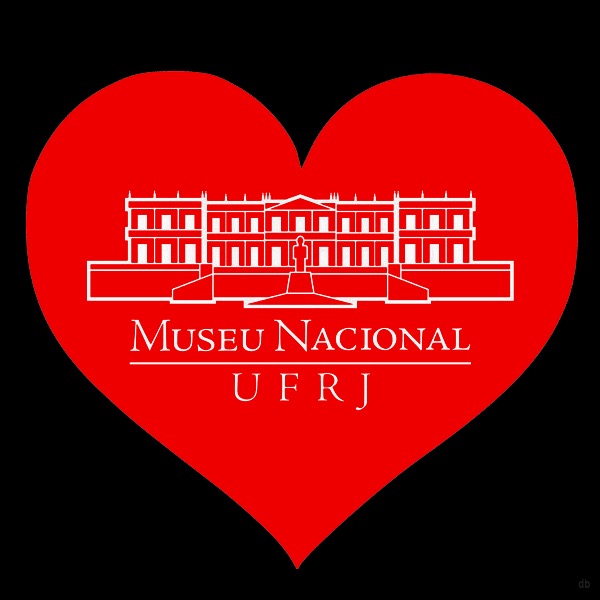
Yesterday, a huge fire broke out at the Museu Nacional in Rio de Janeiro. Those of you who participated in the ICOM-UMAC 2013 in Rio may remember the Museum’s beautiful building, situated in the middle of a city park.
The Museu Nacional is a university museum, part of the Federal University of Rio de Janeiro. It is the oldest museum in Brazil, created in 1818. It hosts one of the largest scientific collections in the world, comprising c. 20 million specimens and artefacts of natural history, anthropology, archaeology, as well as historical archives and libraries.
At this point, the full extent of the destruction remains unknown and so does the cause of the fire. Fortunately, there were no victims. UMAC hopes at least part of the collections have been saved.
There is certainly a need for a full investigation, debate and answers, but for now, this is already one of the largest catastrophes in museum history anywhere in the world. It is most important to recognize the significance of this enormous tragedy and irreplaceable loss for science, education and culture, in Brazil and the world, and to demonstrate solidarity and support to our colleagues at the Museu Nacional.
Presently, UMAC is exploring possibilities of expressing our support in more tangible ways. Meanwhile, we are compiling all supporting messages arriving from all over the world. In due time, we will forward them to the Director of Museu Nacional and to the administration of the Federal University of Rio de Janeiro.
Marta C. Lourenço, University of Lisbon
UMAC-ICOM President
Lisbon 3 September 2018
The vast number of documents that Cesare Lombroso (1835-1909) donated to the University of Turin are now accessible online — an incredible resource for the history of science and the history of Italy and Europe.
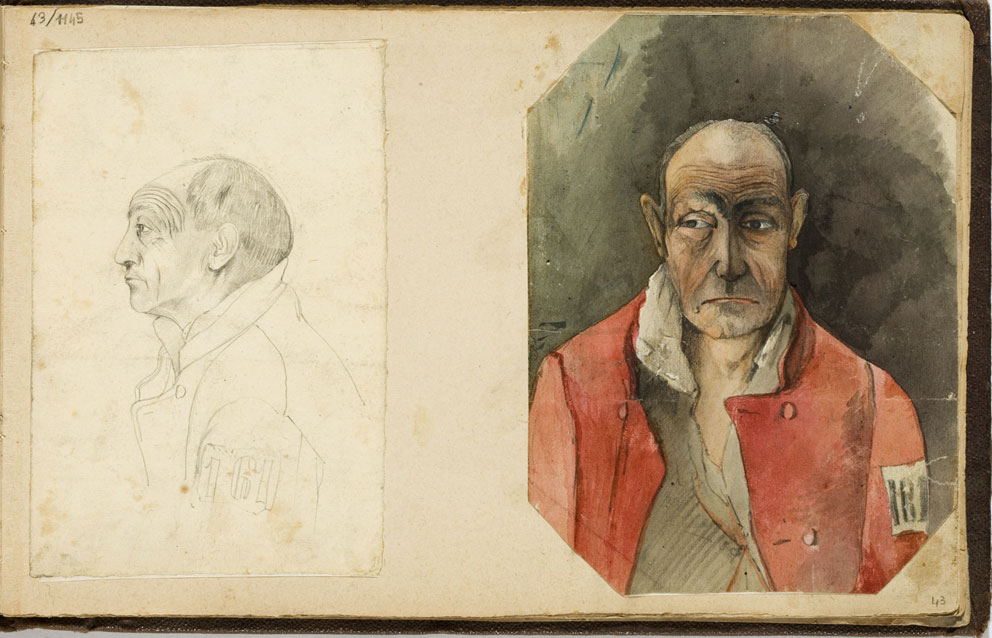
The Lombroso Project was established by the Museum System of the University of Turin, with the support of the CRT Foundation and the Department of History of the University of Turin.
Read about the Lombroso Project and access the documents here.
Also, read about the Museo di Antropologia Criminale ‘Cesare Lombroso’ in UMAC World Database of University Museums and Collections.
The SJTU TD Lee Fund of the Shanghai Jiao Tong University (China) was established in 2013 with the aims of studying and exploring new scientific achievements, encouraging cooperation between scientists and artists, and creating artistic works to show the science itself or the influences that science brings to humans, society and the environment.
The Fund holds scientific symposiums and Science and Art Competitions on one specific scientific theme every year. Since 2014, four competitions have been successfully held whose themes are “Synchrotron Radiation”, “Gravity and General Relativity”, “Parity Nonconservation and Neutrino Physics” and “Quantum and Topology”. In 2018, the theme is “Time Reversal”.
See below how to apply:
Submission Information and Calendar
More information, please contact Xuwei CHEN (xwchen@sjtu.edu.cn)
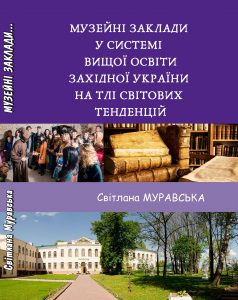
Title: Museum Institutions of the Higher Education System of Western Ukraine on the Background of Word Trends.
Author: Svitlana Muravska
Lviv, 2018, 357 pp.
The timing couldn’t be better: on May 18, 2018, International Museum Day — theme: Hyperconnected Museums — the Anthropology Museum of the Federal University of Goiás, Brazil, launched its museum app.
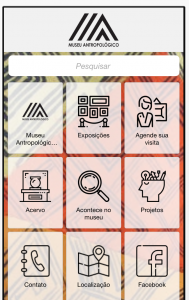
Download it here and have fun! Congratulations!
See more details here. Until 10 June.